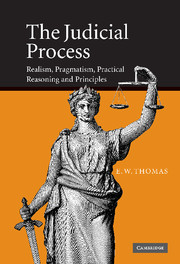Book contents
- Frontmatter
- Contents
- Preface
- 1 Introduction
- 2 Muddling along
- 3 The ‘curse’ of formalism
- 4 Legal fundamentalism
- 5 The idolatry of certainty
- 6 The piety of precedent
- 7 The foibles of precedent – a case study
- 8 There is no impersonal law
- 9 So, what is the law?
- 10 The constraints on the judiciary
- 11 Towards a new judicial methodology
- 12 Of realism and pragmatism
- 13 Of … practical reasoning and principles
- 14 Taking law seriously
- 15 A theory of ameliorative justice
- Subject index
- Authors index
6 - The piety of precedent
Published online by Cambridge University Press: 15 July 2009
- Frontmatter
- Contents
- Preface
- 1 Introduction
- 2 Muddling along
- 3 The ‘curse’ of formalism
- 4 Legal fundamentalism
- 5 The idolatry of certainty
- 6 The piety of precedent
- 7 The foibles of precedent – a case study
- 8 There is no impersonal law
- 9 So, what is the law?
- 10 The constraints on the judiciary
- 11 Towards a new judicial methodology
- 12 Of realism and pragmatism
- 13 Of … practical reasoning and principles
- 14 Taking law seriously
- 15 A theory of ameliorative justice
- Subject index
- Authors index
Summary
A foolish consistency …
I have previously been pleased to quote, roughly in context, the saying of Ralph Waldo Emerson:
A foolish consistency is the hobgoblin of little minds.
Regrettably, it has to be said, there are judges and lawyers who deserve the implied rebuke. They are seemingly obsessed with precedent. With a dedication born of faith, they turn to precedent to reveal the law. The past, it is somehow thought, has predicted the future. Keeping faith with that past is the accepted wisdom. Do not such judges and lawyers portray a ‘littleness’ of mind? Surely, the notion that it is better to be consistent with a past decision and, at the same time, to be foolish in preferring that consistency, is indefensible?
Those judges and lawyers, and not a few academics, who still think of the common law as a body of immutable law, a legacy from the past to be cherished, nurtured and preserved as far as humanly possible in its inherited state, dent the administration of the law. The thinking of some past era, perhaps appropriate to its time and place, is forever being introduced to deal with the problems of today. The law's ability to cope with the fast-moving changes of the modern world is forever shackled by a ‘wisdom’ that belongs to the past. Of course, the experience of history has its value, but it should not be exaggerated beyond what it is – the experience and thinking of the past.
- Type
- Chapter
- Information
- The Judicial ProcessRealism, Pragmatism, Practical Reasoning and Principles, pp. 139 - 163Publisher: Cambridge University PressPrint publication year: 2005

